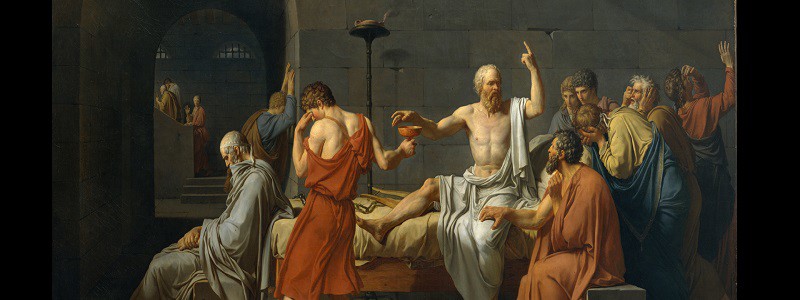
The Argument-Based Socratic Seminar
Named for Socrates (469 – 399 B.C.E.), one of the founders of Western philosophy, the Socratic Seminar is a formalized classroom discussion activity that emphasizes reflective thinking about big questions and the use of evidence to support responses. According to Elfie Israel, in Inquiry and the Literary Text (NCTE, 2002):
The Socratic seminar is a formal discussion, based on a text, in which the leader asks open-ended questions. Within the context of the discussion, students listen closely to the comments of others, thinking critically for themselves, and articulate their own thoughts and their responses to the thoughts of others. They learn to work cooperatively and to question intelligently and civilly.
Some curriculum writers draw a sharp distinction in the context of the Socratic Seminar between ‘inquiry’ or ‘discussion’ and ‘debate,’ stating that the former is to be encouraged over the latter. ReadWriteThink, for example, says that Socratic Seminars ‘prize inquiry over information, discussion over debate.’ But we don’t embrace this dichotomy. Instead the Argument-Based Socratic Seminar brings together inquiry and argument into one project – as these modes are brought together throughout most of academic work at the college and pre-college levels. Though not everything students say in this Socratic Seminar format has to be expressed as an argument, students do get credit for supporting their views with aligned and sufficient evidence, and for engaging with other students’ views. Inquiry leads to argumentation which leads to further inquiry, in a virtuous academic cycle.
Socratic Seminars are effective in part because they are highly student-centered. Ours is too. Students build arguments and propose questions in preparation for the seminar. And during the seminar itself the teacher should take a restrained, minimal moderator role, in addition to tracking and assessing student participation.
Points are accrued in the Argument-Based Socratic Seminar for performing well on the two core standards for rigorous academic argument: the use of evidence and the engagement with other views. Bonus points can be earned for using particular response templates, and points can be deducted if a student fails to participate sufficiently in a round, or if a student participates unconstructively (distracts others, demonstrates a lack of academic focus, or uses ad hominem attacks). Each student earns individual points during the seminar that can be used as an assessment of their performance, but each team also accumulates a point total, which means that students are given both an individual and a team rating score, relative to the assessment rubric designed for this activity.
The full activity, then, fosters student inquiry and argumentation on a set of texts or a data set, organized around a debatable issue, and propelled by student-generated questions. The rigor of the discussion is generated by students’ having to try to excel on the two essential argument-based standards: the use of evidence and engagement with other viewpoints. The crucial feature of responsiveness is aided in the activity through the use of ‘response templates,’ even putting them on to cards and giving bonus points for using the ‘response cards’ that you were dealt.
The Argument-Based Socratic Seminar is not only usable across disciplines, it’s currently being used that way — at least in English language arts, history, and science. As we collect more feedback, we will be improving and refining its features. But with its source rooted in classical antiquity, and given its argumentational upgrade, we feel very good about recommending it and helping teachers implement it here and now.


Trackbacks for this post